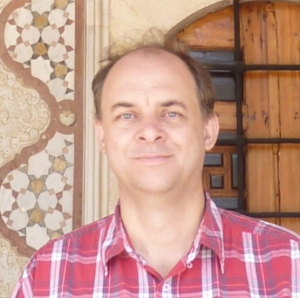2014 Haragan Lecture
Graham Harman, Ph.D
 Distinguished University Professor at the American University in Cairo, Egypt, Graham
Harman was recently described as is "one of the most important philosophers to emerge
in the last twenty years" by Timothy Morton, Rita Shea Guffey Chair of English at
Rice University. The author of eleven books and co-editor of one volume, Harman is
a leading figure in an important philosophical return to metaphysics known as Speculative
Realism. For Harman, metaphysics generates positive information about objects of concern
centering upon reality itself, that is, on the ways the world actually exists. In
particular, speculative realism seeks to a tentative grasp on those aspects of reality
that eludes commonsense conceptions. The first philosopher to be presented in the
Haragan Lecture Series, Professor Harman is renowned for combining down-to-earth reflections
upon basic philosophical questions with a deep historical understanding of the paths
taken by his predecessors. Harman is a refreshingly original thinker who speaks clearly
to a general audience and who invites all to engage questions we routinely take for
granted.
Distinguished University Professor at the American University in Cairo, Egypt, Graham
Harman was recently described as is "one of the most important philosophers to emerge
in the last twenty years" by Timothy Morton, Rita Shea Guffey Chair of English at
Rice University. The author of eleven books and co-editor of one volume, Harman is
a leading figure in an important philosophical return to metaphysics known as Speculative
Realism. For Harman, metaphysics generates positive information about objects of concern
centering upon reality itself, that is, on the ways the world actually exists. In
particular, speculative realism seeks to a tentative grasp on those aspects of reality
that eludes commonsense conceptions. The first philosopher to be presented in the
Haragan Lecture Series, Professor Harman is renowned for combining down-to-earth reflections
upon basic philosophical questions with a deep historical understanding of the paths
taken by his predecessors. Harman is a refreshingly original thinker who speaks clearly
to a general audience and who invites all to engage questions we routinely take for
granted.
Ecology Without Networks
Although the title of this lecture makes a playful reference to Timothy Morton's important book Ecology Without Nature, its central topic is the ecological work of the acclaimed sociologist of science Bruno Latour. Latour's We Have Never Been Modern was one of the most important theoretical reflections published in the 1990's. By arguing that modernity could never make good on its attempts to separate nature from society, Latour argued for a world made of networks of hybrid actors in which natural and social elements are inevitably combined and assembled. But what level of reality do these hybrid networks inhabit? This issue became increasingly prominent over the past decade, as Latour developed his distinction between "matters of fact"–realities said to exist independently of their effects on other things–and "matters of concern," which exist only through their interrelations with other things. Latour's recent Gifford Lectures in Edinburgh on the topic of Gaia use "composition" as the latest term for "matters of concern." For Latour, Gaia is a matter of concern: it names an approach to worldly processes that must be composed by carefully assembling both natural and social actors. It is not a matter of fact that exists independently of this composition.
Harman's lecture will point to a number of valuable insights that arise from Latour's conception of Gaia, while also discussing some aspects of nature thereby lost.
CISER: Center for the Integration of STEM Education & Research
-
Address
CISER, Box 43131, Texas Tech University, Lubbock, TX 79409 -
Phone
806.742.2883 -
Email
ciser@ttu.edu
